
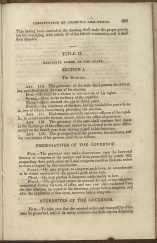
ART. 110. The governor of the state shall possess the following qualifications at the time of his election.
First,--He shall be a citizen in the exercise of his rights.
Second,--Born in the territory of the republic.
Third,--Have attained the age of thirty years.
Fourth,--An inhabitant of this state, having resided five years therein, two of which immediately preceding the election.
ART. 111. Ecclesiastics, military and other officers of the republic, in actual service thereof, cannot obtain the office of governor.
ART. 112. The governor of the state shall continue four years in the discharge of his office, and cannot be re-elected to the same office, except on the fourth year from having ceased in his functions.
ART. 113. The prerogatives of the governor, his attributes, and the restrictions of his powers, shall be as follows.
First,--The governor may make observations upon the laws and decrees of congress in the manner and form prescribed by article 102, suspending their publication until said congress resolves thereon, unless in cases excepted by this constitution.
Second,--He may propose to congress such laws or amendments as he thinks conducive to the general good of the state.
Third,--He may pardon delinquents conformably to law.
Fourth,--The governor cannot be accused for any crime whatever committed during his term of office, and one year after, reckoned from the date whereon he ceased in his functions, except before congress, and after the expiration of that term, not even before congress.
First,--To take care that the internal order and tranquillity of the state be preserved, and of its safety without--for both objects disposing of the militia of said state, of which he shall be commander in chief throughout its territory.
Second,--See that the constitutive act, the federal and state constitutions, the laws decrees and orders of the general government, and of the congress of said state be fulfilled, issuing the proper orders and decrees for their execution.
Third,--Form, with the advice of the council, such instructions and regulations as he deems necessary for the better government of the departments of the public administration of the state, which he shall transmit to congress for approval.
Fourth,--Appoint agreeably to the constitution and laws, all the officers of state not chosen by the people, or as otherwise provided by law.
Fifth,--Freely appoint and remove the secretary of state.
Sixth,--See that justice be promptly and fully administered by the tribunals and courts of justice of the state, and that their decisions are executed.
Seventh,--Take care of the administration and collection of all the state rents, and decree their disposition according to law.
Eighth,--Suspend from office, as long as three months, and deprive of even one-half their salary for the same length of time, after hearing the advice of the council, all officers of the executive department, and of his appointment or approval on violating his orders of decrees, transmitting the data on the subject to the respective tribunal, should he think there is a proper ground of action.
Ninth,--Propose to the standing deputation, whenever he thinks proper after hearing the advice of the council, the convocation of congress to extra session.
The governor shall not have the power,--
First,--To command the civic militia of the state in person without the express consent of congress or during its recess, the resolution of the permanent deputation. Whenever he commands the said militia on the aforesaid condition, the vice governor shall discharge the duties of governor.
Second,--Interfere in the examination of causes pending, or dispose in any manner of the persons of those accused in criminal cases, during the trial.
Third,--To deprive any one of his liberty or impose punishment upon him, but when the well being and safety of the state require the arrest of any person, he may effect it on condition of putting the persons arrested, within forty-eight hours, at the disposal of a competent tribunal or judge.
Fourth,--Take possession of the property of any private individual or corporation, or disturb him in the possession, use, or benefit thereof, unless it should be necessary for a purpose of manifest public utility in the judgment of the executive council, in which case he may do so with the concurrence of the council, and approval of congress, and during the recess, of the permanent deputation, always indemnifying the party interested agreeably to the opinion of appraisers chosen by the executive and the said party.
Fifth,--Impede or embarrass in any manner, or under any pretence the popular elections determined by this constitution and the laws, or that they have their entire effect.
Sixth,--Leave the capitol to go to any other part of the state for a longer time than one month; should he require a longer time or should he be under the necessity of leaving the state, he shall request licence from congress, and during recess, from the permanent delegation.
ART. 114. For publishing the laws and decrees of the congress of the state the governor shall use the following form:
"The Governor of the State of Coahuila and Texas, to all the inhabitants thereof: Be it known, that the Congress of said State has decreed as follows:
(The original words of the law or decree to be here inserted.)
Wherefore I command it to be printed, published, and duly fulfilled."
(Transcription, errors in original preserved)
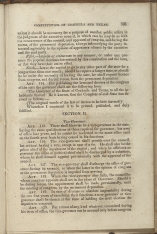
ART. 115. There shall likewise be a vice-governor in the state, having the same qualifications as those required for governor; his term of office four years, and he cannot be re-elected to the same office until on the fourth year from having ceased in his functions.
ART. 116. The vice governor shall preside over the council, but without having a vote, except in case of a tie. He shall also be the police chief of the department of the capitol; and when he officiates as governor the office of political chief shall be discharged by a substitute, whom he shall himself appoint provisionally with the approval of the council.
ART. 117. The vice-governor shall discharge the office of governor during its vacancy, or when the latter in the opinion of congress or the permanent deputation is impeded from serving.
ART. 118. When the vice-governor also fails, the councillor whom congress appoints shall act in the place of Governor. Should it be during recess, the appointment shall be made provisionally, until the meeting of congress, by the permanent deputation.
ART. 119. In case of decease or absolute impossibility during the two first years of exercising their functions, a new governor or vice-governor shall be chosen at the time of holding the next election for deputies to congress.
ART. 120. For crimes of any kind whatever, committed during his term of office, the vice-governor can be accused only before congress.
(Transcription, errors in original preserved)

ART. 121. For the better discharge of the duties of his office the governor shall have a body for consultation, to be styled Executive Council, which shall be composed of three voters proper, and two substitutes, of all whom one only can be an ecclesiastick.
ART. 122. For being a member of the council the same qualifications shall be required as for being a deputy. Those not eligible as deputies, cannot be councillors.
ART. 123. The council shall be renewed every two years, one voter proper, and one substitute, the last chosen, retiring in the first, the other members proper and the other substitute in the second instance, and so on successively.
RT. 124. No councillor can be re-elected until the fourth year from the expiration of his office.
ART. 125. When the vice governor attends the council he shall preside without having a vote, and in that case the vice governor shall not attend.
ART. 126. The secretary of the council shall be one of the members thereof, in the manner and form provided in its internal rules, which the council itself shall form and present to the executive, who shall transmit them to congress for approval.
ART. 127. The attributes of the council shall be as follows:
First,--To give the governor a written report in all business wherein the law imposes on the latter the duty of requesting the same, and in other matters wherein the governor himself thinks proper to consult said body.
Second,--Watch over the observance of the constitutive act, federal constitution, and general laws of the union, constitution and private laws of the state, apprizing congress of any violations it may observe.
Third,--Promote establishment of, and give activity to, all the branches of prosperity of the state.
Fourth,--Propose nominations of three for filling those offices, wherein the law exacts this requisite.
Fifth,--Concur with the permanent deputation agreeably to article 80, on the convocation of congress to extra session, and meet with said deputation for the temporary measures that may be necessary in those cases mentioned in article 90.
Sixth,--Explain the accounts of all the public funds, and transmit the same to congress for approval.
ART. 128. The council shall be responsible for all acts relating to the exercise of its attributes.
(Transcription, errors in original preserved)
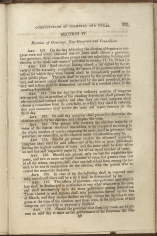
ART. 129. On the day following the election of deputies to congress each and every electoral district judge junta shall choose a governor, vice governor, three councillors proper and two substitutes, holding said election in the mode and manner provided in articles 71, 72, 73, and 74.
ART. 130. Said election having closed, a list signed by the secretary of the assembly, comprising the names of the persons elected and offices for which they were chosen, shall be immediately posted in the most public place. The acts shall be signed by the president and electors, and attested copies thereof authorized by the said president, secretary and tellers shall be transmitted, enclosed in a certified sheet, to the standing deputation.
ART. 131. On the day the first ordinary sessions of congress are opened, the ex-president of the standing deputation shall present the aforementioned attested copies, and after they are read, congress shall choose a committee from its own body, to which they shall be referred, that said committee may review the same and report thereon on the third day.
ART. 132. On said day congress shall proceed to determine the elections made by the districts, and compute the votes.
ART. 133. The person who receives the absolute majority of votes of the district electoral assemblies, to be computed according to the whole number of voters composing the same, shall be governor, vice governor, or councillor, as the election under consideration may be.
ART. 134. Should not person receive the aforesaid majority, congress shall elect for said offices one of the two or more individuals having the highest number of votes; and the same shall be done when no one has said respective majority, but all an equal number of votes.
ART. 135. Should one person only receive the respective majority, and two or more an equal number of votes, but greater than that of all the others, congress shall elect one individual from among the former, to be run in competition for the election, with the person who received the respective majority.
ART. 136. In case of time the balloting shall be repeated once only, and should there still be a tie it shall be determined by lot.
ART. 137. The offices of governor, vice-governor and councillors shall be discharged in preference to any other whatever in the state, and shall successively have the same preference among themselves. Those elected to said stations shall take possession thereof on the first of March, and they cannot decline serving, except the deputies to congress at the time of election, and those who, in the judgment of said congress, are morally or physically disabled.
ART. 138. Should the governor elect from any cause, not be present on said day to enter on the performance of his functions, the vice-governor newly chosen shall enter on the discharge of the office, and should he also be absent, his default shall be supplied agreeably to article 118.
(Transcription, errors in original preserved)
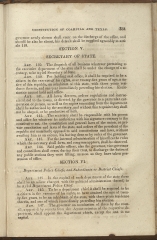
ART. 139. The despatch of all business whatever pertaining to the executive department of the state shall be under the charge of a secretary, to be styled Secretary of State.
ART. 140. For holding said office, it shall be required to be a citizen in the exercise of his rights, over twenty-five years of age, a native of this republic, an inhabitant of this state, with three years residence therein, and one year immediately preceding his election. Ecclesiastics cannot hold said office.
ART. 141. All laws, degrees, orders regulations and instructions circulated to the towns, or directed by the governor to a particular corporation or person, as well as copies emanating from the department shall be authorized by the secretary, and without this requisite they shall not be obeyed or be productive of faith.
ART. 142. The secretary shall be responsible with his person and office for whatever he authorizes with his signature contrary to the constitutive act, the constitution and general laws of the union, or private constitution and laws of the state, and orders of the president of the republic not manifestly opposed to said constitutions and laws, without availing him as an excuse, his having done so by order of the governor.
ART. 143. For the internal administration of his office the rules which the secretary shall form, and congress approve, shall be observed.
ART. 144. Said public officer, also the governor, vice-governor and councillors shall cease, during their trust, to discharge the duties of any public stations they were filling, as soon as they have taken possession of office.
(Transcription, errors in original preserved)

ART. 145. In the capital of each department of the state there shall be an officer charged with the political administration thereof, to be styled Department Police Chief.
ART. 146. To be a department chief it shall be required to be a citizen in the exercise of his rights, to have attained the age of twenty-five years, to be an inhabitant of the state, with three years residence therein, and one of which immediately preceding his election.
ART. 147. The governor on nomination of three by the council supported by reports from the Ayuntamientos of the respective department, shall appoint the department chiefs, except the one in the capital.
ART. 148. The chiefs of department shall be immediately subject to the governor, and in no way to each other.
ART. 149. In the capitol of each district, except the one where the department chief resides, there shall be furthermore, a subordinate or district chief, appointed by the executive on nomination of three by the said chief of department.
ART. 150. The subordinate or district shall possess the same qualifications as the department chiefs, with the difference that the domiciliation and residence must be within the precincts of the same district; and they shall furthermore, have some honorable way of living, sufficient to afford them a suitable support.
ART. 151. The term of office of the district shall be the same as that of the department chiefs, and, on nomination by the latter, they may also continue in office.
ART. 152. No one can decline serving in said trusts, except in case of re-election to the same within four years from the time of serving, or from some other legal cause in the opinion of the governor, who shall resolve after hearing the respective chief of department.
ART. 153. Both of these and the department chief shall be responsible for all their acts of omission against the constitution and general laws of the republic, and those of the states, the former to said chiefs of department, under whose immediate orders they shall act, and the latter to the governor.
ART. 154. The attributes of both chiefs, and the manner they are to exercise the same, shall be detailed in the regulations for the politico-financial administration of the towns.
(Transcription, errors in original preserved)
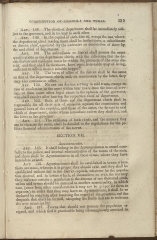
ART. 155. It shall belong to the Ayuntamientos to attend carefully to the police, and internal administration of the towns of the state, and there shall be Ayuntamientos in all those towns where they have heretofore existed.
ART. 156. Ayuntamientos shall be established in towns where there are none, wherein it is proper they should exist, and they shall be established without fail in the district capitals, whatever be the population thereof, and in towns which, of themselves or with the territory they embrace contain a population to the amount of one thousand souls, unless said towns should be annexed to another municipality, in which case, (since from other considerations it may not be proper for them to separate,) in order that they may have an Ayuntamiento, it shall be so declared by congress, after receiving the report of the governor, and the despatch that shall be formed, assigning the limits that are to embrace the new municipality.
ART. 157. Towns that should not possess the population assigned, and which find it practicable being advantageously annexed to another or others, shall constitute a municipality, and the Ayuntamiento shall be established at the place most convenient in the opinion of the executive.
ART. 158. In towns wherein Ayuntamientos cannot be established, and which are so distant from the other municipalities that the latter cannot attend to the internal administration thereof, the electoral juntas of that to which they belong shall choose a commissary of police and a sindice procurador to discharge the duties assigned them in the regulations for the political administration of the towns.
ART. 159. The Ayuntamientos shall be composed of the Alcalde or Alcades, Sindico or Sindicos, and Regidores, whose number shall be designated in the aforementioned regulations.
ART. 160. To be a member of the Ayuntamiento it shall be required to be a citizen in the exercise of his rights, over twenty-five years of age, or twenty-one being married, an inhabitant within the jurisdiction of the Ayuntamiento, with three years residence therein, one year immediately preceding their election, to have some capital or trade whereby to subsist, and to be able to read and write.
ART. 161. Public officers receiving a salary from the state, military and other officers of the general government in actual discharge of their duties, and ecclesiastics, cannot be members of the Ayuntamiento.
ART. 162. The Alcaldes shall all be replaced every year, of the regidores, one half their number, and sindicos procuradores the same, should there be two; should there be only one he shall be replaced every year.
ART. 163. A person who has performed the duties of said trusts cannot hold any other municipal office, or be re-elected to that which he filled, until after two years from having ceased therein.
ART. 164. The members of the Ayuntamientos shall be chosen by the municipal electoral meetings, which shall be holden in the same manner as the municipal meetings established for the election of deputies to congress. The former juntas shall be convoked on the first Sunday in December, and they shall meet and perform their duties on the second Sunday and day following.
ART. 165. Pursuant to said meetings those citizens who have received the greatest number of votes in the respective lists shall be considered constitutionally elected as Alcaldes, Regidores and Sindicos. In case of a tie between two or more persons it shall be decided by lot by the Ayuntamiento acting at the time of the election.
ART. 166. Should any member of the Ayuntamiento decease, or his office become vacant from any other cause, the person receiving the highest number of votes in the order of the respective list shall succeed him in the discharge of the duties.
ART. 167. Ayuntamiental offices shall be municipal charges, which no one can decline.
(Transcription, errors in original preserved)

